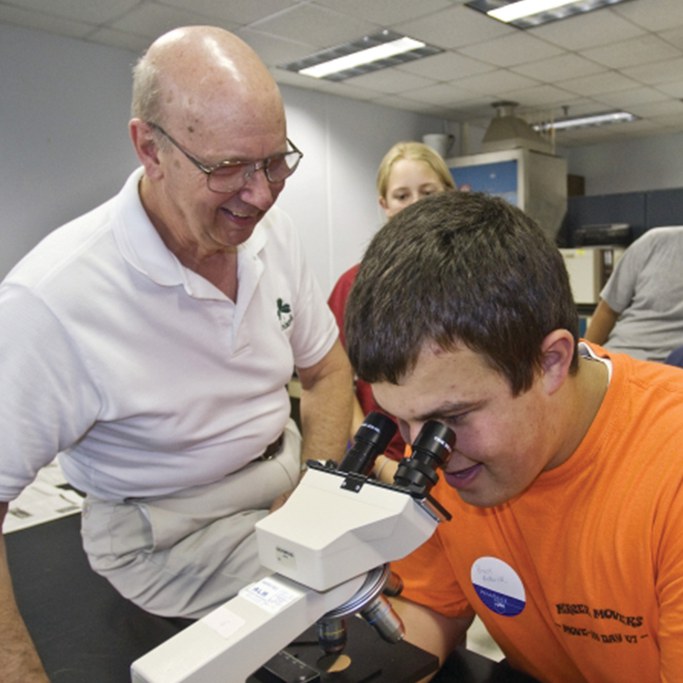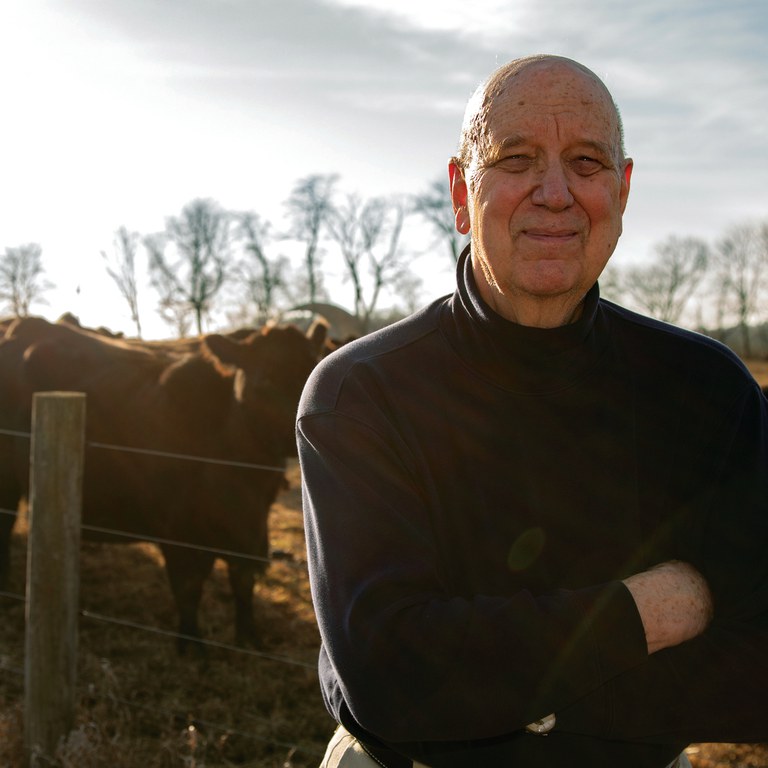Posted: March 2, 2020
Lester Griel retires after 54 years of teaching and mentoring in the college.
On a Friday afternoon in July of 1997, Adam Hoover, his parents, and his younger sister made a spur-of-the-moment trip from their McConnellsburg home to explore Penn State's University Park campus.
At the time, Hoover, a high school junior, knew he wanted to be a veterinarian but was pondering where to pursue pre-veterinary studies. He had narrowed his choices to three universities, with Penn State, his father's alma mater, among them.
Strolling around the area of the campus nicknamed "Ag Hill," the Hoover tribe made its way to the Henning Building, home to the Department of Veterinary and Biomedical Sciences. Hoover's father suggested they visit the administrative office and see if anyone would speak with them.
"I was reluctant to do that because we didn't have an appointment," Hoover recalled. "I didn't think anyone would be available or willing to see us."

To his surprise, the family was seated in a conference room and introduced to Lester Griel, professor of veterinary science and coordinator of the undergraduate program, who spent more than an hour going over the program and answering questions. The meeting was a turning point for Hoover.
"The fact that he showed so much interest in a random high school student off the street spoke volumes to me about how he must treat his actual students," said Hoover, who practices at Franklin Animal Clinic in Franklin. "Dr. Griel is the reason I chose Penn State. His devotion to my success helped cement my path to becoming a veterinarian."
Service to others, whether it be students, colleagues, or animals, has been a purposeful choice for Griel, who joined the College of Agricultural Sciences faculty in July 1965. He spent the next 54 years teaching and mentoring innumerable students who were pursuing a career in veterinary medicine before he retired last year.
"At my high school commencement, we sang an anthem that had the words, 'No man is an island; no man stands alone.'" Griel said. "Those words stuck with me, and I have always tried to operate that way. Everything we do in life should be a team effort, and everybody has something to contribute."
A Reluctant College Student
Unlike many students Griel has met who have dreamed of being a veterinarian since "in utero," the idea never crossed his mind as a youngster, despite regular visits to relatives' dairy farms near Harrisburg. He describes himself as a "reluctant college student" and attended Penn State on his mother's insistence, admitting that he "would have been just as happy milking cows for the rest of my life."
At college, Griel took the "bull by the horns," immersing himself in two undergraduate research projects. A fellow student took notice of his aptitude for animal science and encouraged him to become a veterinarian, but the idea didn't take hold until the summer after his sophomore year, when Griel worked on a dairy farm in New Jersey; his boss was a veterinarian who took his young charge on emergency calls.
"I got to know the veterinarians, saw what they did, and came to realize the positive impact they had on communities through their work to keep animals healthy. From that point on, I wanted to be a veterinarian," Griel said.
"I Like Seeing People Learn"
In 1961, with a bachelor's degree in dairy science from Penn State in one hand and an offer of admission to the University of Pennsylvania's School of Veterinary Medicine in the other, Griel set off for Philadelphia. Four years later, he received a doctor of veterinary medicine degree, an achievement that brought him gratification but came with a price tag.
That looming student debt served as the catalyst for his return to Penn State in 1965, having been hired to fill in for a University veterinarian who was on sabbatical. Griel's initial plan was to serve the one-year appointment, pay down his loans, get experience, and then mull his options.
But as the year progressed, he found his second calling--teaching--while serving as a guest lecturer in a few courses. "I've been at Penn State ever since," said Griel, who was promoted to assistant professor in 1971, associate professor in 1975, and full professor of veterinary science in 1990.
"I like seeing people learn. And, the students kept me on my toes; occasionally one would ask a question that made me stop and readjust my way of thinking," he said. "Teaching makes you keep up with the latest advancements and knowledge."
A popular adviser to decades of pre-veterinary students, as well as students who found their way into other careers, in 1999 his colleagues and current and former students lobbied for him to receive the College of Agricultural Sciences Alumni Society's Excellence in Academic Advising Award.
"Dr. Griel has served as an inspiration to me in my academics, as well as other aspects of my life," wrote Kristie Short, who was a senior at the time she penned her letter of support. "Even though he keeps a rigorous schedule, there has never been a time in the past four years when he has not been available to talk about a student's progress academically or even last week's football game."
Short added that Griel's understanding of the curriculum offered at Penn State and his knowledge of the skills and abilities needed for success in the workplace and in further academia were unequaled. "He has the ability to recognize a student's strengths and weaknesses and suggest career paths that accentuate the best in students. His meticulous approach to ensure that no student 'slips through the cracks' creates a small-college experience at a very large campus."
Griel was also lauded with the 2014 Penn State Graduate School Alumni Society Lifetime Achievement Award. Among those who supported him for this honor was Robert Van Saun, extension veterinarian and professor of veterinary science.
In his nomination letter, Van Saun shared that he has had numerous conversations with veterinarians from across the U.S. who, upon learning that he teaches at Penn State, will ask him if he "knows Dr. Griel." After a response of "yes," Van Saun will then hear about the positive influence that Griel had on the person's early learning experiences and career.
"I cannot emphasize enough how many times I have experienced this conversation," Van Saun wrote. "I believe this is the ultimate testament to the impact of Dr. Griel on generations of veterinarians who started their undergraduate career at Penn State. Dr. Griel is essentially synonymous with the pre-veterinary program at Penn State."
Griel's passion for teaching and advising came through to Hoover, who took several of his classes and was a member of the Pre-Veterinary Club, for which Griel served as a co-adviser. "Dr. Griel gave of himself unselfishly and inspired us to always give our best. His down-to-earth approach helped us to understand how his lessons connected to the real world."
Another of his former students, Brian Kopec of Kopec Veterinary Associates, an equine practice in Lancaster County, also appreciated Griel's teaching style, saying that the professor "always had a way of turning complicated concepts into common sense. I found Dr. Griel to be a very practical man who doesn't seem to know that he is brilliant."
Kopec went on to say that if he has a fraction of the impact on the veterinary community that Griel has had, he will consider his career a success. "It is what I strive for every day. I know that Dr. Griel is proud of all of the students he has mentored, and the best way to honor his career is to practice good medicine, help others achieve their goals, and give back to the community."
A Great Mentor and Friend
Teaching wasn't Griel's only contribution to the field of animal science. He engaged in collaborative research on reproductive diseases of cattle, as well as bovine reproductive physiology--earning a master's degree in dairy science for an early project. He also served as a university veterinarian and an adjunct associate professor of medicine at the University of Pennsylvania's School of Veterinary Medicine.
Griel is credited with shepherding several initiatives in his academic department, including changing the name of the Animal Bioscience bachelor's degree program to Veterinary and Biomedical Sciences and coordinating instruction and training for all faculty advising within the major.
He served as interim head of the department from 1986 to 1987, and was asked to aid many committees, including those that focused on academics, promotion and tenure, and animal care. Griel also was a member of numerous recruiting teams, helping the department find the best and brightest talent. It was during one of those interviews that fellow veterinarian Nüket Acar met Griel. She soon discovered his generosity of spirit.
"Dr. Griel is a very smart, dedicated, and insightful person," said Acar, coordinator of undergraduate advising. "He has been a great mentor and friend to many of us. He was never afraid of speaking his mind and never backed down on his beliefs. I always admired his honesty."
Another quality that she respected was his dedication to students. "He deeply cared about his students and their successes, and he always put their needs ahead of any other priorities. And the students adored him. He has left a huge legacy--and his shoes are not going to be filled because there is no other Dr. Griel."
--Amy Duke
Features
Fostering Forests
Across the United States, forests face unprecedented threats, and scientists in Penn State's College of Agricultural Sciences are conducting novel and complex research to conserve them.
Buzzing With Purpose
Community scientists work to protect Pennsylvania's wild bees
Conservation Reimagined
Exploring new approaches to cope with a changing climate



